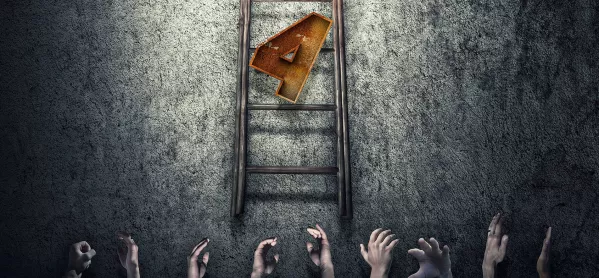1 in 10 pupils excluded at primary ‘pass’ GCSE English and maths

More than 90 per cent of pupils excluded in primary school don’t go on to achieve a grade 4 “pass” mark or greater in their English and maths GCSEs, a study published today has found.
Almost two-thirds (64 per cent) of pupils excluded in primary school were also persistently absent once they reached secondary, according to research from children’s mentoring charity Chance UK.
Chance UK commissioned FFT Education Datalab to track five academic-year cohorts from Reception to GCSE, which included data from 3.2 million pupils using the National Pupil Database in England.
The report found 88 per cent of pupils who were permanently excluded in primary school don’t go on to achieve a grade 4 in English GCSE, compared to 25 per cent of pupils without a suspension or exclusion. In maths, 80 per cent of pupils permanently excluded in primary don’t go on to achieve a grade 4 in GCSE, compared with 27 per cent of their peers.
The charity’s report warned that exclusions “start a devastating never-ending cycle of difficulties for the child”.
Exclusions affect certain groups ‘substantially more than others’
The study found that almost all (97 per cent) of pupils excluded at primary school had a special educational need or disability (SEND).
More than two-thirds (67 per cent) of pupils with an exclusion or suspension at primary school had also been on free school meals.
And almost six in 10 pupils were identified as a ‘Child in Need’ by social services during their school life, the report found.
- Feature: How social services cuts affect school exclusions and suspensions
- SEND support: Why every school needs an inclusion action team
- Early years: Sure Start centres ‘improved disadvantaged pupils’ GCSEs’
The findings show how pupils are being “failed” by the lack of specialist early intervention support, said Darren Northcott, national official for education at NASUWT teaching union.
Mr Northcott also warned that there is a “system of special needs assessment which remains difficult to navigate, slow and under-resourced”.
Responding to the report, Paul Whiteman, general secretary of the NAHT school leaders’ union said that suspensions and exclusions are only used as a “last resort”. He added that exam grades are “rarely a result of one factor alone”.
“Schools work hard to help children secure support when they face challenges in their lives which can impact their behaviour, wellbeing, and academic attainment,” Mr Whiteman added, but warned that they “cannot resolve these complex issues alone”.
Warnings of ‘decimated’ support services
Chance UK are calling for “ring-fenced funding” for specialist support in primary schools, alongside “regular statutory training for all school staff and trainee teachers” on best practice to reduce exclusions.
The charity also recommends that an “individual plan of support” should be put in place for pupils, involving specialist support, to reduce the risk of exclusion.
Niamh Sweeney, deputy general secretary of the NEU teaching union, echoed the report’s demand for specialist services but warned that support services have been “decimated”, “leaving schools and families to cope on their own”.
“The report reinforces what many have been saying for years: that the toxic combination of financial cuts, staffing shortages, increasing class sizes and a narrowed and restrictive curriculum is severely impacting young people’s educational prospects,” Ms Sweeney added.
Correlation and causation
Warnings against primary school exclusions have previously been made by former children’s commissioner Anne Longfield, who called for a ban on permanent exclusions in the school setting.
Ms Longfield, who is now executive chair of the Centre for Young Lives said that the education system is “failing to meet the needs of some of our most vulnerable children”, leading to a “carousel of classroom disruption, suspension and exclusion, frequent school moves, and very poor educational outcomes”.
Tom Bennett, the Department for Education’s behaviour management adviser, said the report had mixed up “correlation and causation”.
He added: “The idea that suspensions and exclusions somehow cause these later life problems is completely unevidenced, when it is obvious to anyone working with these children that it is their behaviour that causes both.
“Students who attack other children, or teachers, or abuse or harass others tend to get suspended or excluded if the behaviour persists long enough. And that behaviour, if sustained in life, frequently leads to lack of later life success. It’s bizarre to think otherwise.”
A DfE spokesperson said: “Primary age exclusions are rare, a last resort and should not mean exclusion from education - but we are clear we back head teachers to use suspensions and exclusions where required to provide calm, safe, and supportive environments.
“For pupils at risk of exclusion, we’ve set out a new model for alternative provision schools to work with mainstream schools and provide targeted support early on, helping improve behaviour, attendance and reduce the risk of exclusions.”
For the latest education news and analysis delivered directly to your inbox every weekday morning, sign up to the Tes Daily newsletter
Keep reading for just £1 per month
You've reached your limit of free articles this month. Subscribe for £1 per month for three months and get:
- Unlimited access to all Tes magazine content
- Exclusive subscriber-only stories
- Award-winning email newsletters



